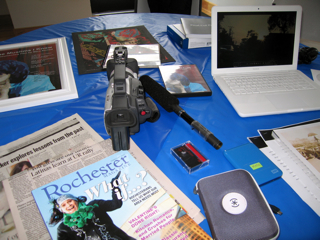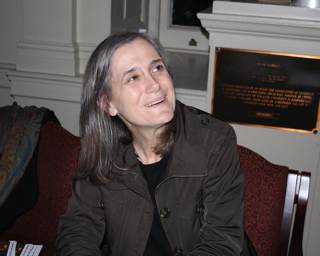some filmmaking tools i shared with high school students when speaking to them about being a part of the media – career fair, islamic center of rochester, feb 25, 2012.

some filmmaking tools i shared with high school students when speaking to them about being a part of the media – career fair, islamic center of rochester, feb 25, 2012.

cartoon by michael ramirez, democrat and chronicle (the biggest selling local newspaper in rochester), november 16th. how effed up is this?

november 3, 2011: just met amy goodman at syracuse university. she had been invited by the syracuse peace council as part of their 75th anniversary celebration. she talked about the importance of independent media and the power of grassroots movements – occupy wall street, the egyptian revolution, the gaza flotillas. she talked about her arrest (along with two other democracy now reporters) outside the republican national convention in 2008 and how they had just won concessions from the st paul police dept and the u.s. secret service (a rare victory). the lesson there is that when the police tell u to stop filming, that’s exactly when u turn on ur camera – it’s a constitutional right. she talked about covering troy davis’s execution and that was the only time her voice broke. very deliberately, she compared it to lynching. she explained how people involved in social change, whether they see the results in their lifetime or not, r in fact shaping the future. she mentioned frederick douglass, susan b anthony and rosa parks. she called them troublemakers and stressed the importance of not being silent.
she speaks fast and jumps from one world event to another. she is knowledgeable and witty but what i related to most was her passion. u can feel it in everything she says – in her excitement about people’s movements, in her commitment to truth and justice. it’s palpable. it’s contagious. i told her about my documentary work and about how, when i speak to students on college and university campuses, the first thing i urge them to do is to watch democracy now. she was v pleased and introduced me to her producers who r also pakistani-american. on the way out i met dear, like-minded friends and got to catch up with them. the air was brisk but not too chilly and the city of syracuse lit up the view from the campus. a lovely evening…

In his book “You Are Not a Gadget: A Manifesto” Jaron Lanier criticizes digital technologies, including Wikipedia and social-networking sites like Facebook and Twitter, which he describes as dehumanizing and designed to encourage shallow interactions.
…
“The thing about technology is that it’s made the world of information ever more dominant. And there’s so much loss in that. It really does feel as if we’ve sworn allegiance to a dwarf world rather than to a giant world.”
…
“If you are only a reflector of information, are you really there?”
…
More here.
Reading has been supplanted, as Carr puts it, by “the speedy, superficial skimming of information” culled from the links generated by a Google search, which discourages “any deep, prolonged engagement with a single argument, idea, or narrative.” Whereas once we nurtured our private selves by communing with literature, now we have only a “library of snippets.”
…
You may be sipping a Starbucks latte in your chinos, but clicking on those top links, your sense of what is important conforms to collective norms as surely as if you were wearing a gray flannel suit to your corporate office. Indeed, you might be better off at the mercy of IBM or General Motors, because at least then you could see the disturbing truth lurking under the “idealization of maximum connectedness”: that with every Google search or friend request or tweet or stolen look at your BlackBerry, you are that much more firmly plugged into the collective and that much less in touch with yourself.
…
Carr offers a quick tour of the labs where MRI-aided scientists have been peering into human brains to observe this rewiring, and the news is not good. A UCLA professor claims that daily use of digital devices “stimulates brain cell alteration and neurotransmitter release.” Another UCLA scientist reports that our “working memory” isn’t designed to multitask, and that as a result “learning facts and concepts will be worse if you learn them while you’re distracted.” A Swedish neuroscientist has found that when our brain is overtaxed by all that information, we find “distractions more distracting,” and a team at the University of Southern California warns, in Carr’s words, that “the more distracted we become, the less able we are to experience empathy, compassion, and other emotions.” A University of Wisconsin neuroscientist, one of the first to discover the plasticity of the adult brain, looks at the big picture and acknowledges that online tools may be indispensable but concludes, in the same capital letters the surgeon general requires on cigarette pack health warnings, that “their heavy use has neurological consequences.” The problem with the Internet is not philosophical but scientific, says Carr, which means it’s not only a matter of our intellectual lives, of the significance of depth or the necessity of self-exploration, or anything else debatable, but of our physical health. It’s a medical, not a moral, concern.
The Internet’s distributed structure contributes to the impact it has had on speech, assembly, and politics—it has lowered economic barriers to entry for publishers and activists alike, and it has enabled peer-to-peer or many-to-many audience strategies that seem to favor bottom-up political activity.
…
This is not to suggest that political command and control of the Internet is impossible, only that it is harder than, say, control of a national broadcast television network.
…
The question at home and abroad, then, is whether the decentralized, redundant, distributed shape of the Internet will tip that balance further in favor of centralized powers by yielding to the Cycle—the consolidating patterns of monopoly and state control that shaped radio and television—or whether the Internet will remain a radically open system, biased toward users over authorities.
…
Ultimately, the preservation of an open Internet, and of the empowerment of individuals it promises—the preservation of virtual public spaces—will require its beneficiaries to fight to keep it. It will require “the cultivation of a popular ethic concerning our society’s relation to information, an ethic consistent with the importance of information in our individual and collective lives,” one that is grounded in “awareness of the imminent perils of a closed system.” Whether sufficient numbers of people will acquire such awareness and act on it is not at all clear.
The greatest single contribution that Western societies can make to the Internet’s potential to empower repressed populations abroad would be to preserve at home the very openness of social media that has inspired the likes of Wael Ghonim. More here.
this was my position throughout this sad episode: we must wait to hear what logan has to say, we must wait to get more info before making any comments. unfortunately, msm had a field day with this. it fit their agenda too perfectly, plus it was sensational – something they could get a lot of mileage out of. also interesting that stories like this, which show a diff side, r not making it into msm. the truth doesn’t matter.
…
Later I spoke with two young male activists who helped the person I later learned was Lara Logan (I didn’t know her before, I don’t usually follow US networks). They were Omar El Shennawy, a 21 year old teacher of English, and Abdulrahman Elsayed, a 25 year old teacher of physical education. They said they had formed a human chain with other young men to protect Logan, and then delivered her to the Egyptian Museum military post. Full article.
As a person dies, should their online presence end too? What should happen to all that personal information? Full article.
one picture that’ll never make the cover of time magazine.
Samia, a 26-year-old activist from Kabul who took part in the demonstration, said that NATO has only aggravated the situation over the past decade and fed a parasitic and dependent Afghan government. “We want NATO troops and American troops to leave Afghanistan. Even with their huge army, they couldn’t do anything in the past 10 years. And in the future, they won’t be able to do anything. The result will be just death and casualties and our innocent Afghan women and children will die,” she said.
Here are the principles under which Facebook operates:
– You have control over how your information is shared.
– We do not share your personal information with people or services you don’t want.
– We do not give advertisers access to your personal information.
– We do not and never will sell any of your information to anyone.
– We will always keep Facebook a free service for everyone.
They have called their project Diaspora* and intend to distribute the software free, and to make the code openly available so that other programmers can build on it. As they describe it, the Diaspora* software will let users set up their own personal servers, called seeds, create their own hubs and fully control the information they share. The Diaspora* group was inspired to begin their project after hearing a talk by Eben Moglen, a law professor at Columbia University, who described the centralized social networks (such as Facebook) as “spying for free.” Full article.
amy goodman on the riz khan show: Has the mainstream media in the US replaced serious coverage with “junk news” and tabloidism? Especially in foreign affairs, are Americans less informed than ever? Who is shaping their perceptions of the rest of the world? And who is policing US foreign policy? Watch interview.
Michael Moore’s next film explores the root causes of the global economic meltdown and takes a comical look at the corporate and political shenanigans that culminated in what Moore has described as the biggest robbery in the history of this country.
Whoever Reads Bourgeois Newspapers Becomes Blind and Deaf: Away with These Stultifying Bandages!, 1930, John Heartfield
talking of images and their effect on transforming culture, here is an exhibit by christopher slack. in view of the statements he is trying to make about war and violence, what do u think?
i like the idea of the tension between opposites – whether it be between the veil and nudity, kali the goddess/heroine and the monstrosity of violence, the sacred (religion) and profane (sexuality), and of course “us” vs “them”. the pictures are v clean cut, very produced, like an advertisement – is our own self image as a society carefully crafted in a studio? is the same true for “other” cultures?
while editing my film i needed images of women in burqas, so i googled “burqa”, “hijab”, “chador” etc. interestingly enough, along with some images of muslim women wearing the hijab, i happened upon an even larger pool of images of western women in various degrees of undress (some pictures were borderline pornographic) sporting a hijab so dire that their heads were completely blacked out. it was ironic – the liberated western woman juxtaposed against the repressed muslim woman. too funny. these paintings remind me of that contradiction.
for me, the pictures are reminiscent of raquel welch in “one million years bc” or jane fonda in “barbarella” with the addition of contemporary symbols such as the hijab, the kalashnikov, terrorism. the paintings are unsettling. they’re provocative. but they are also quite stereotypical: the objectification of women, the use of sex to titillate and sell (including one’s artwork), and orientalism (eastern women shown exclusively in the context of a harem or as dancing girls complete with diaphanous clothing and veil). so although i am not sure about how profound the images are, they do provoke some discussion.